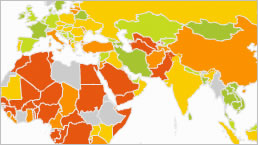Remittances represent a major source of income for millions of families globally and often a critical first point of entry into the regulated financial market for conventionally unbanked segments of the population. For many families and persons worldwide, their remittance receiving account increases visibility, thus accessibility, of other financial services and encourages people to conduct transactions via more transparent means that are subject to at least some AML/CFT monitoring.
G20 countries will continue to work on cost reduction objectives and other policy goals, while remaining alert to the challenges posed by indiscriminate ‘de-risking’ actions as well as the opportunities offered by economies of scale and innovation in the financial technology space. On the one hand, ‘de-risking’ may negatively affect competition and financial inclusion, although new evidence is emerging that the impact may not be as significant as previously feared and consolidation may have benefits as well. On the other hand, innovative technologies and business models could help gain further ground in promoting financial inclusion and financial transparency. These competing forces on remittance prices and the interdependencies between them will continue to require attention.
This document summarizes each jurisdiction’s progress and achievements in the implementation of their individual National Remittances Plan.


